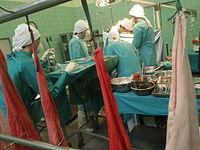
Photo from wikipedia
Blood samples for ABO and HLA typing were received from the OPO on a potential deceased donor. The donor medical records indicated AMS due to hemorrhagic stroke, no significant PMH… Click to show full abstract
Blood samples for ABO and HLA typing were received from the OPO on a potential deceased donor. The donor medical records indicated AMS due to hemorrhagic stroke, no significant PMH and no recent transfusions. ABO typing was performed by serological agglutination and HLA typing was performed by SSP/melt curve analysis. Results indicated that the donor was blood group O and had HLA typing consistent with the donor’s reported race. The results were reported to the OPO and organ allocation proceeded. Upon review of the UDRAI, a transplant program requested repeat HLA typing on lymph nodes (LN) as the next of kin indicated that the donor received a BMT 15 + years ago for aplastic anemia prior to residing in the USA. The LN results were concordant with the initial blood HLA typing. The repeat indication and testing results were reviewed by the lab general supervisor with the OPO’s AOC since DNA from LN was expected to also have a predominant BMT-donor origin as well. To ensure the correct HLA type of the allocated organs, buccal swab and muscle biopsy samples were requested for repeat testing. Additional HLA typing of these samples confirmed the previous results, indicating that the organ donor most likely received a fully HLA-matched BMT. The confirmed results were reported to the OPO; however, the HLA lab recommended re-allocation as an AB blood group donor since 30–40% of BMTs are ABO incompatible. The OPO reallocated and informed all transplant programs involved that the deceased donor’s tissue ABO typing could not be verified as group O. In conclusion, the HLA lab should be knowledgeable about ABO as it relates to all types of transplantation and provide consultation regarding results and testing limitations. This case also demonstrates the HLA lab can only give proper advice when provided important donor related information. Furthermore, effective communication is vital to managing increasingly complex donors and transplant cases.
Journal Title: Human Immunology
Year Published: 2018
Link to full text (if available)
Share on Social Media: Sign Up to like & get
recommendations!